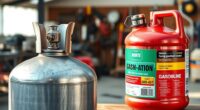If you suspect fuel contamination, look for signs like engine stalls, misfires, rough idling, and vibrations during acceleration. Notice strange smells in your vehicle, such as fuel odor or chemical scents, and check for cloudy or murky fuel in the tank. Keep an eye on exhaust smoke and warning lights, as these indicate trouble. Monitoring fuel efficiency also helps spot issues early. Staying alert to these symptoms helps protect your vehicle—there’s more to uncover to keep it running smoothly.
Key Takeaways
- Recognize engine issues like misfires, vibrations, and rough idling indicating possible fuel contamination.
- Notice fuel smells, unusual odors, or cloudy fuel in the tank as signs of contamination.
- Monitor exhaust for white, blue, or black smoke, which can point to fuel system problems.
- Track fuel efficiency changes and watch for warning lights that signal fuel system or contamination issues.
- Conduct regular inspections, professional testing, and address leaks or clogged filters promptly to prevent damage.
Recognizing Unusual Engine Performance
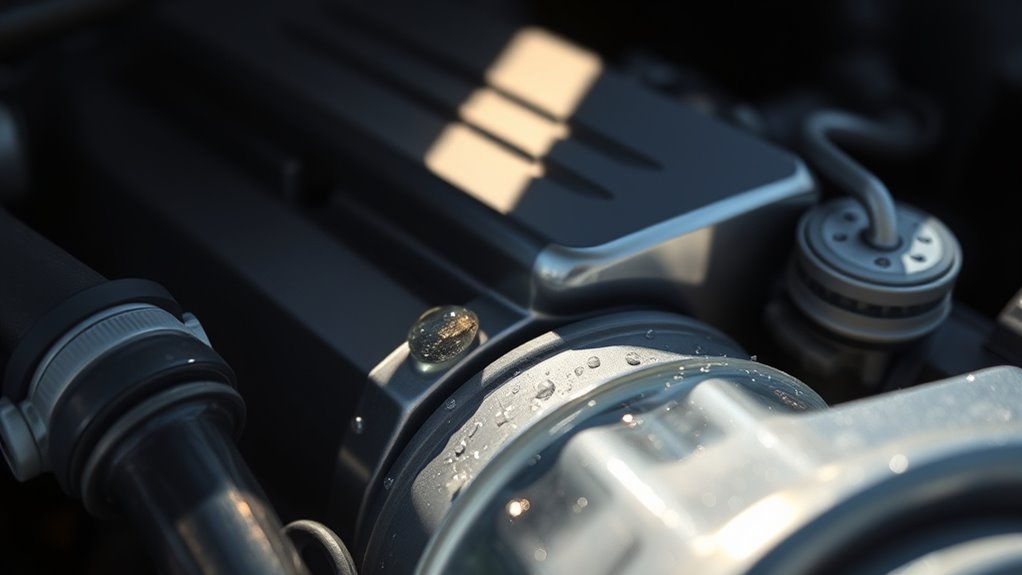
Unusual engine performance is often one of the first signs that your fuel may be contaminated. If you notice your car stalling, hesitating, or experiencing rough idling, it’s time to consider fuel system maintenance and troubleshooting. Contaminated fuel can cause misfires, poor acceleration, or a drop in fuel efficiency. You might also feel vibrations or hear knocking sounds during acceleration. These symptoms point to possible fuel issues, and addressing them early can prevent further damage. Regular engine troubleshooting helps identify these problems promptly. Checking fuel quality and ensuring your fuel system stays clean are key steps to maintain optimal engine performance. If symptoms persist, consult a mechanic to diagnose and resolve the underlying contamination swiftly.
Noticing Strange Smells in the Vehicle
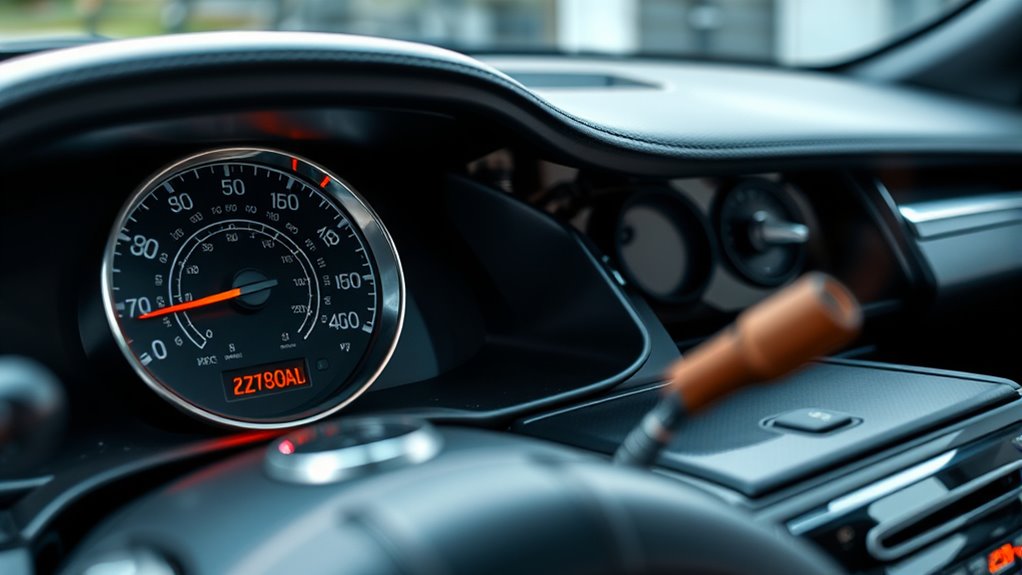
If you notice strange smells inside your vehicle, it could be a sign of fuel contamination. A persistent fuel odor or a lingering scent after you stop might indicate a problem. Pay attention to these odors, as they can help identify potential issues early. Additionally, unusual smells may be related to fuel system issues, which can impact engine performance and safety.
Unusual Odors Inside Vehicle
Strange smells inside your vehicle can be more than just a nuisance; they often signal underlying issues like fuel contamination. If you notice a fuel-like or chemical odor, it might be due to contaminated fuel affecting your vehicle’s systems. These odors can linger despite basic air fresheners, requiring odor elimination techniques. Understanding fuel additive effects helps you identify whether contaminants are causing the smell. To combat this, consider using fuel system cleaners or professional cleaning services. Recognizing father-daughter bond themes can remind you of the importance of caring for your vehicle as you would a loved one, ensuring safety and longevity.
Persistent Fuel Smell
A persistent fuel smell inside your vehicle can be a clear sign of underlying issues that require immediate attention. It might stem from fuel additive effects that leave a lingering odor or a leak in the fuel system. Often, a faulty or clogged fuel filter can cause fuel vapors to escape, intensifying the smell. If you notice this odor, consider inspecting the fuel filter and replacing it if necessary, as a dirty filter can’t efficiently trap contaminants or vapors. Additionally, fuel additive effects can sometimes cause unusual smells if incompatible additives are used. Using professional voiceover techniques when addressing these issues can help communicate urgency and clarity to service providers. Addressing these issues promptly helps prevent further damage and ensures your vehicle runs safely and efficiently. Don’t ignore the smell—taking action now can save you from costly repairs later.
Lingering Scent After Stop
When you notice a lingering scent after turning off your vehicle, it’s often a sign that fuel vapors or other odors are escaping into the cabin. This can happen if your fuel injection system isn’t sealing properly or if there’s a leak somewhere in the fuel lines. Additionally, improper oil viscosity may cause engine components to run hotter, increasing vapor release. Strange smells can also indicate that fuel isn’t burning completely, leading to residual fumes. If these odors persist, it’s a good idea to have your vehicle inspected for leaks or worn seals. Regular inspection of the fuel system and seals helps prevent fuel leaks, which are a common cause of contamination and odors. Addressing the root cause early prevents potential fuel contamination and keeps your cabin fresh and safe. Remember, lingering scents aren’t normal and shouldn’t be ignored.
Monitoring Fuel Efficiency Changes
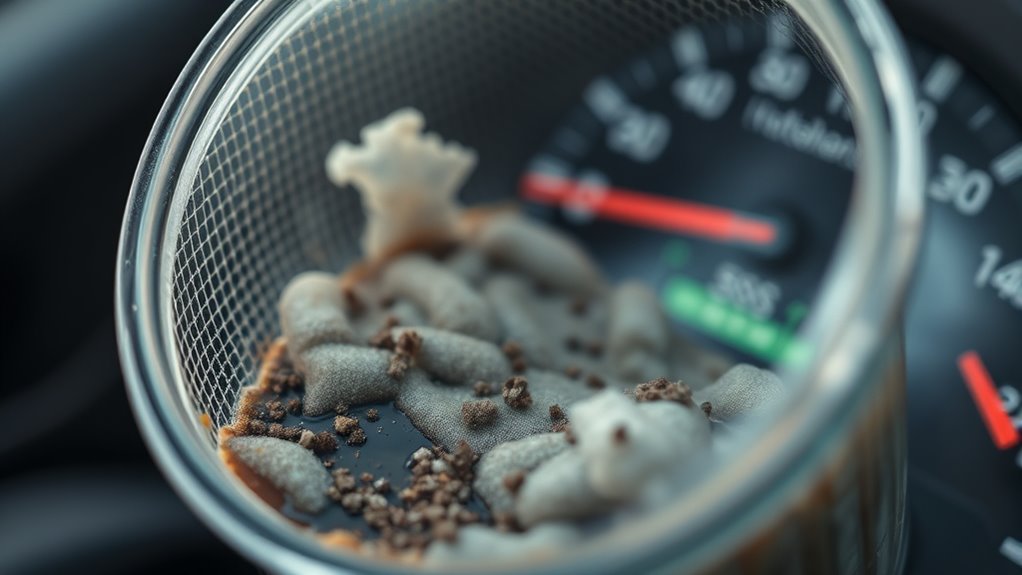
Monitoring your vehicle’s fuel efficiency is a practical way to detect early signs of fuel contamination. If you notice a sudden decrease in your miles per gallon or inconsistent fuel economy, it could indicate fuel issues. Keep track of your fuel consumption regularly and compare it with your typical performance. This simple habit helps you spot changes early, so you can address problems before they worsen. Incorporate basic maintenance tips, like ensuring your fuel filters are clean and your injectors are functioning properly, to maintain ideal fuel efficiency. Being attentive to these fluctuations allows you to catch potential fuel contamination early, saving you money and preventing damage to your engine. Regularly monitoring fuel quality can help prevent more serious issues and extend the lifespan of your vehicle. Stay proactive to keep your vehicle running smoothly and efficiently.
Detecting Engine Misfires or Hesitations
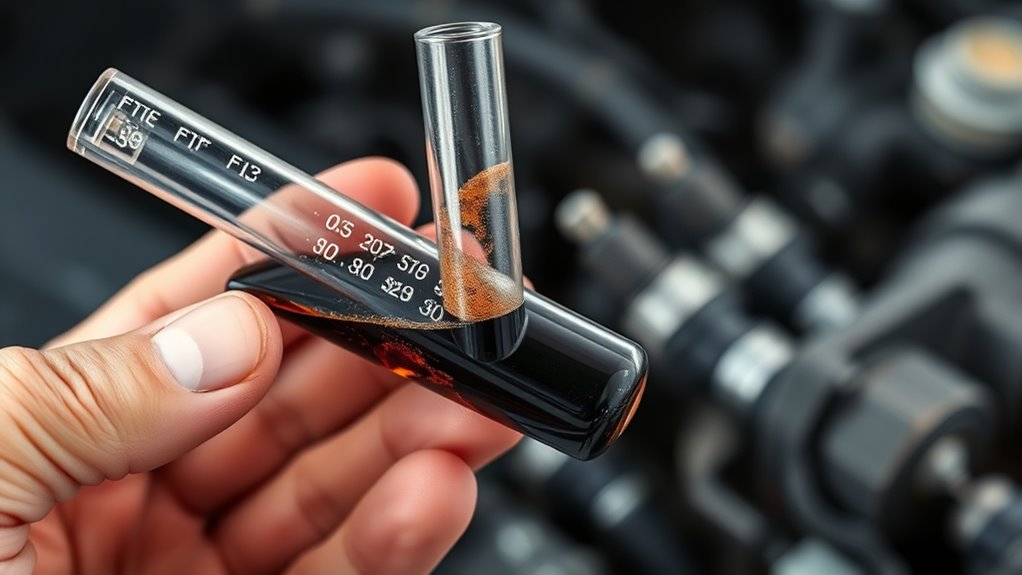
You might notice your engine suddenly losing power or feeling rough while idling. Unusual vibrations or hesitations during acceleration are also common signs. Recognizing these symptoms early can help you identify potential fuel contamination issues before they worsen. Additionally, inconsistent engine performance may be linked to fuel quality concerns, highlighting the importance of proper fuel management.
Sudden Power Loss
Sudden power loss is a clear sign that your engine might be experiencing misfires or hesitations, often caused by contaminated fuel. If your vehicle suddenly struggles to accelerate or stalls unexpectedly, contaminated fuel could be be the culprit. Poor fuel storage practices can lead to water or debris mixing with your fuel, causing engine issues. Using the right fuel additives can help improve fuel quality and prevent contamination. These additives clean your fuel system, ensuring smoother combustion. If you’re storing fuel for a long time, consider stabilizers to maintain its integrity. Regularly checking your fuel for signs of contamination and using quality additives can help prevent sudden power loss and keep your engine running efficiently. Additionally, fuel quality is essential for maintaining optimal engine performance and avoiding issues caused by contamination.
Rough Idling Feel
A rough idling feel often indicates that your engine is misfiring or hesitating due to contaminated fuel. When fuel quality drops, debris or water can clog your fuel filter, restricting flow and causing uneven fuel delivery. This inconsistency results in engine misfires, which you’ll notice as roughness or shakiness during idle. Additionally, contaminated fuel can foul your spark plugs, reducing their ability to ignite the mixture properly. Worn or dirty spark plugs struggle to produce a strong spark, further contributing to rough idling and hesitation. To address this, check and replace your fuel filter regularly, and inspect your spark plugs for signs of wear or fouling. Keeping these components in good condition helps guarantee a smooth, steady idle and prevents engine misfires caused by fuel contamination. Understanding fuel quality is essential for maintaining optimal engine performance.
Unusual Engine Vibrations
Unusual engine vibrations can be a clear sign that your engine is misfiring or hesitating, often due to fuel contamination. When contaminated fuel enters your system, it can clog the fuel filter, restricting proper flow and causing engine misfires. You might notice your vehicle vibrating more than usual, especially during acceleration or at idle. Loose or worn engine mounts can exacerbate these vibrations, making them feel more intense. If you experience shaking or stumbling, it’s a good idea to inspect the fuel filter for blockages and check engine mounts for wear. Recognizing vibrations early can save you costly repairs and keep your vehicle performing reliably. Additionally, using quality fuel can help prevent contamination and maintain engine performance.
Observing Contaminated Fuel in the Tank

You can often identify contaminated fuel by closely inspecting the fuel in your tank. Look for changes in fuel color—cloudy or murky shades suggest contamination. Also, check the tank’s cleanliness; sediment or debris at the bottom indicates dirty or water-laden fuel.
Here’s a quick visual guide:
| Indicator | What to Look For |
|---|---|
| Fuel color | Unusual hues, cloudiness |
| Tank cleanliness | Sediment, debris, water presence |
| Overall appearance | Murky, contaminated look |
If you notice any of these signs, it’s a strong cue that your fuel needs attention. Regular inspection helps catch contamination early, protecting your engine from potential damage.
Identifying Excessive Exhaust Smoke

Excessive exhaust smoke is a clear sign that something may be wrong with your engine or fuel quality. Pay attention to the diesel exhaust and its smoke color. White smoke often indicates coolant leaks or condensation, while blue smoke suggests oil burning, which can stem from fuel contamination. Black smoke is a sign of incomplete combustion, possibly due to a clogged fuel filter or excess fuel injection. If you notice thick, persistent smoke, it’s a sign that your engine isn’t burning fuel efficiently. This not only impacts performance but can also signal contaminated fuel or other issues. Regularly observing your exhaust can help you catch problems early, especially if you notice changes in the smoke color or an increase in smoke volume.
Understanding Warning Lights and Error Codes
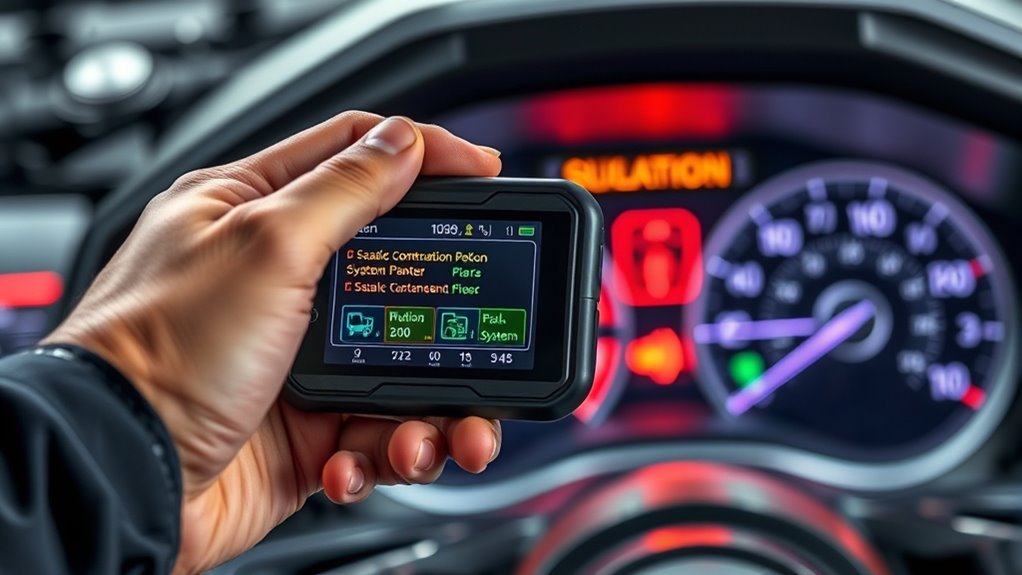
Understanding warning lights and error codes is essential for diagnosing fuel contamination issues early. When your vehicle’s warning light activates, it signals a problem with the fuel system that needs immediate attention. Using fuel system diagnostics and warning light troubleshooting, you can pinpoint issues quickly. Error codes stored in the system provide specific clues about contamination or component failure. Refer to the table below to interpret common warning lights:
| Warning Light / Error Code | Meaning |
|---|---|
| Check Engine Light | Fuel contamination detected or sensor issue |
| Fuel Filter Warning | Clogged filter or water in fuel |
| Engine Light | Fuel system malfunction or error code P0171/P0174 |
| Service Reminder | Maintenance needed for fuel system components |
| Fuel Pump Warning | Fuel pump failure or fuel contamination detected |
Stay alert to these signals for timely fuel system diagnostics.
Checking for Water in the Fuel System

Water in the fuel system can cause serious engine problems, so it’s important to check for it regularly. One effective method is fuel sample testing, which involves drawing a small amount of fuel from your tank and inspecting it for water presence. You can also use water separation kits, designed to remove water from your fuel before it reaches the engine. These kits often include a clear container to observe water accumulation or a test strip to indicate water contamination levels. Regular testing helps catch water buildup early, preventing costly damage. If you notice water in your fuel sample or see signs of water separation, take immediate action to drain or treat your fuel. Staying vigilant ensures your engine runs smoothly and avoids contamination-related breakdowns.
Knowing When to Seek Professional Inspection
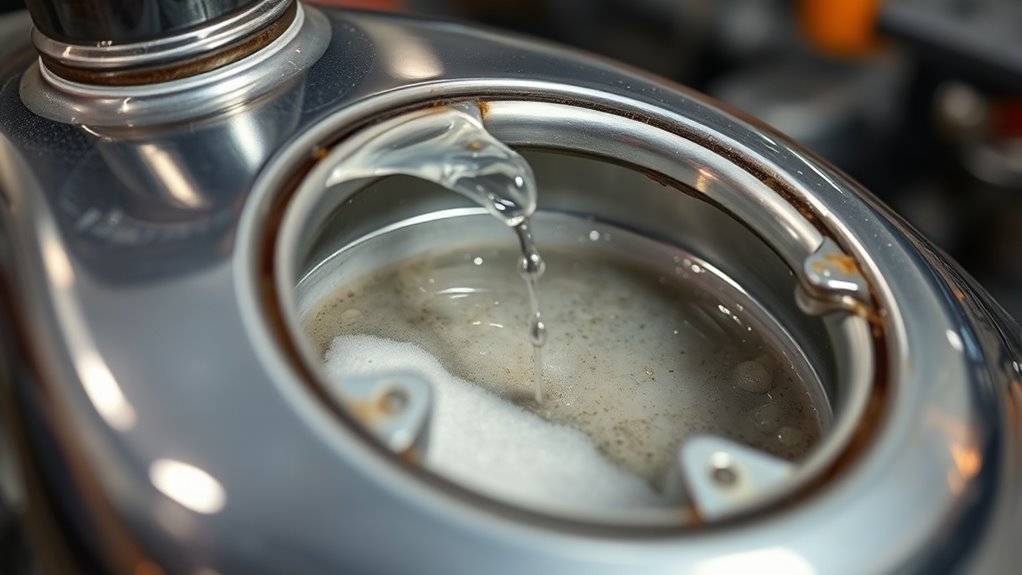
While checking for water in your fuel system is an important step, there are times when symptoms or issues go beyond what simple testing can reveal. If your vehicle continues to experience rough running, decreased power, or frequent stalls despite basic checks, it’s time to consider a professional inspection. Poor fuel quality can cause subtle or severe problems that require expert diagnosis. A professional inspection can identify contamination issues, water presence, or degraded fuel that aren’t easily detectable on your own. Trusting a trained technician ensures your fuel system is thoroughly evaluated and cleaned if needed. Recognizing when to seek expert help prevents further damage, saves you time, and restores your vehicle’s optimal performance efficiently.
Frequently Asked Questions
Can Contaminated Fuel Cause Long-Term Engine Damage?
Contaminated fuel can definitely cause long-term engine damage if left unaddressed. Poor fuel quality introduces debris, water, or other contaminants that can clog injectors, damage pistons, and corrode engine parts. Over time, these issues reduce engine longevity and performance. To protect your vehicle, always use high-quality fuel and get your fuel system inspected regularly, preventing costly repairs and ensuring your engine stays in top shape.
How Does Water Contamination Affect Fuel System Components?
A stitch in time saves nine, and water contamination can seriously harm your fuel system. Water ingress causes fuel degradation, leading to rust, corrosion, and clogged filters. It can damage injectors and pumps, reducing efficiency and risking engine failure. You must regularly check for water in your fuel, use proper additives, and keep your tank sealed. Addressing water contamination early keeps your engine running smoothly and prevents costly repairs down the line.
Are There DIY Methods to Test for Fuel Contamination?
Yes, you can perform DIY testing to check fuel quality. One simple method is to use a clear container to take a small fuel sample and observe for water or debris settling at the bottom. You can also add a fuel additive designed to detect water contamination, which will change color if water is present. These easy tests help identify potential fuel contamination early, saving you from costly repairs.
What Safety Precautions Should I Take With Contaminated Fuel?
When handling contaminated fuel, safety should be your top priority. Wear gloves and eye protection to avoid skin and eye contact. Store the fuel in approved, sealed containers away from heat sources and open flames, following proper storage precautions. Handle the fuel in well-ventilated areas to prevent inhalation of fumes. Always dispose of contaminated fuel responsibly, adhering to local regulations, to protect yourself and the environment.
How Often Should Fuel Systems Be Professionally Inspected for Contamination?
You should have your fuel system professionally inspected at least once every 12 months or sooner if you notice issues. During these inspections, technicians check for contamination, water, and sediment, and may recommend fuel additives to prevent future problems. Regular inspection intervals help catch contamination early, ensuring your system stays clean and efficient. If you use contaminated fuel frequently, consider more frequent inspections to maintain peak performance.
Conclusion
Don’t ignore these signs—they’re your car’s way of warning you about fuel contamination. While some issues might seem minor, addressing them early can save you costly repairs later. If you’re unsure, it’s always best to seek professional help rather than risking engine damage. Remember, catching symptoms early keeps your vehicle running smoothly and confidently. Trust your instincts, stay vigilant, and don’t hesitate to get expert advice when needed.

